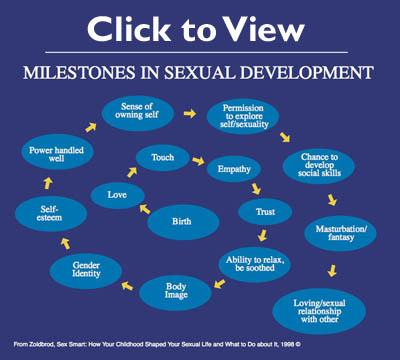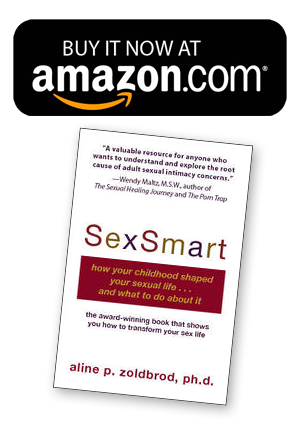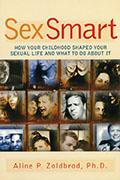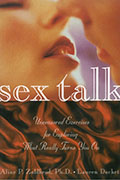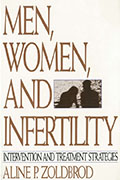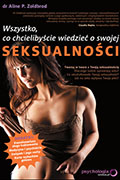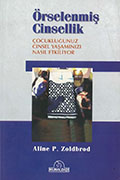Milestones in Sexual Development
It’s not easy for the layperson –or even the mental health generalist– to tease out what is causing an individual’s or a couples’ sexual difficulty.
Click to Download/Print the Milestones in Sexual Development
Click to Download/Print the Milestones in Sexual Development
My hope is that by using this website, you will become more knowledgeable about the possible causes of your sexual problem. Please read through this material, even if you don’t think the information is relevant. Maybe it is. In my many years of experience as a sex therapist, I have found that most people don’t understand what makes them tick sexually.
Sexual problems and dysfunctions are complicated and specific to you or to you and your partner. They have many dimensions. Often two or more factors are operating at the same time. Some problems are based in your faulty beliefs about sexuality. Some occur because you need to learn some new sexual skills. Sometimes, you know your own sexual recipe, but you need to learn how to communicate it. Sometimes sexual problems have a physical basis.
Sometimes sexual problems are really simple to fix: Often, people don’t set aside the time to have really pleasurable sex. Remember, spontaneity is highly overrated!
Some sexual issues exist because you feel frightened of your own sexuality. Some occur because of traumatic events in your past. Some sexual problems exist because of non-sexual events which occurred in your family-of-origin. You may have failed to complete what I call the Milestones of Sexual Development. (See the diagram above.) For instance, large numbers of people do not enjoy being sexual because they don’t really enjoy physical touch. They weren’t touched nicely in their family, so they don’t link touch and love, or touch with safety.
Some people’s sexuality is stunted because they have a huge amount of anxiety, which interferes with getting aroused.
Sometimes in a relationship, you’ll be so angry with your partner that your general anger will come out as a sexual problem (Click Here to assess your general satisfaction in your relationship).
Many couples with longstanding sexual issues go for help to couples therapists who do not address the sexual issues. This is a mistake. Couples’ sexual problems can grow and grow, and leave a toxic residue in the non-sexual relationship. If you have a sexual problem that has created hurt and anger in your non-physical relationship, address the sexual problem directly. It is not true that sexual problems will automatically disappear when the other relationship problems are cleared up. Sex therapists are trained in couples therapy too. We have to be to do our job. If sex is a part of your couples conflict, see a sex therapist.
No matter what you believe is the cause, if you can’t solve your sexual problems within a short amount of time, get professional help from a certified sex therapist. Good sex is worth fighting for.
Learning to Be a Sexual Person: The Milestones Of Sexual Development
Learning to be a sexual person is not the automatic process many people think it is. You learn to be sexual in your family of origin. And, ironically, you learn to be sexual (or don’t learn how to be sexual) from your experience of many non-sexual events which you had in your family.
(If you experienced sexual abuse or rape, then your negative experiences were sexual ones. But the way the abuse or rape was handled in your family also will affect your sexuality.)
In order for you to feel interested in being sexual with another beloved person, you first have to be comfortable with feeling intense feelings in your own body. You have to like being touched. And you have to link love and touch.
This means that if you witnessed or experienced physical violence in your family, you will probably have sexual problems. You will link touch and danger. You might link touch with being overpowered.
Further, you have to trust another person. You have to feel your partner will listen to you and care about how you are feeling. You need to feel that it is all right to be vulnerable with them emotionally, that they will take good care of you.
In fact, to be able to have passionate sex with a beloved partner, you need to have witnessed a number of positive non-sexual themes in your family-of-origin during your childhood and adolescence. I call these the Milestones of Sexual Development.
They include:
- being loved
- being touched both lovingly and playfully
- receiving empathy

- learning to trust
- learning how to relax and be soothed by the person you trust
- feeling safe in your own body
- developing a good body image
- becoming comfortable in your gender identity
- feeling that you can trust people of your gender and those of the opposite gender
- developing self-esteem
- feeling good about the way your parents handled their power over you and over each other
- feeling that you own your own body
- having permission to explore yourself, your body, and your sexual feelings
- learning how to develop social skills and make friends
Adolescent issues:
- integrating masturbation or sexual fantasy into your life in a healthy way
- separating from your parents emotionally
- being able to be in a loving, sexual relationship with another person.
Problems in Your Experience in Your Family Of Origin Can Cause Sexual Problems
What you probably don’t realize is that these old, family-of-origin issues can be the cause of any “individual” sexual problem or dysfunction you could name: lack of desire, sexual pain, arousal issues, (erectile dysfunction, lubrication issues), orgasm issues. In addition, it is quite common for old, family of origin issues to be causes of couples’ sexual problems.
You can begin to assess whether you have family-of-origin sexual problems right now, just by downloading SexSmart’s model and asking yourself these questions, taken from the book::
Stage One: Love
- Do you feel that your parents loved you?
- Do you expect other people to love you?
Stage Two: Touch
- Do you associate touching and love?
- Do you associate touching and safety?
- Does playful touch feel safe?
- Does touch from a loved person feel natural?
- Does it make you feel secure to make eye contact with someone you like or love?
- Do you enjoy the sights, sounds, smells, and tastes of making love?
Stage Three: Trust and Empathy
- Do you have trouble trusting others?
- Do you associate touching and trust?
- Do you have trouble trusting your partner, even though you consciously realize that he/she is trustworthy?
- Do you have trouble relaxing in your body when you are alone?
- Do you have trouble relaxing in your body when you are with a trusted person?
- Can you let deep feelings of relaxation in your body be a path to a sexual trance?
- Can you get into a “sexual trance” with a beloved, trusted person?
These First Three Milestones Are the “Ground Zero” of Sexuality
If you have had problems achieving any of these first three Milestones of Sexual Development in your family of origin, there is a very good chance that you will have sexual problems. It will be difficult for you to let yourself feel sexually and emotionally intimate with the same person. It may be hard to “let yourself go” sexually. In fact, if your family background was extremely difficult or very unaffectionate or unpredictable or unempathic or chaotic, you may not feel yourself to be a sexual being at all.
Why are these three Milestones so important?
Think of your associations to touch and trust as the first step in a cascade of good physical and emotional associations you may need to feel first in your body before you can feel the building up of sexual arousal:
love—> touch—> trust—> love—> safety—> drift—> float
love—> touch—> trust—> love—> safety—> drift—> float—>> AROUSAL
Consistent, good experiences with loving touch helps you to make crucial links which you need. You need to be able to link love with touch, and touch with safety.
Playful touch needs to feel good, too.
Then, think about what you learned about whether you could trust your parents to take care of you and treat you kindly. You might not be motivated to get into a relationship with another person if what you learned about relationships in your family was that they are “iffy” or disappointing or downright dangerous.
If you learned bad associations about trust and empathy in your family of origin, it is common to be distrusting of friends, lovers, and committed partners in your life. This can be true even if they are generally trustworthy. When you are carrying around old trust issues, all it can take is one or two disappointments in your current life, and your guard might go up. If you distrust your partner, you will unconsciously try to pick fights to push him or her away, sexually, emotionally, or both. That’s why it is so important to identify and work on old trust issues.
Let’s go on to the rest of the Milestones, which are also important in your ability to experience sexual pleasure with a partner.
Stage Four: Body Image
• Do you feel good about your body now?
• Did your parents touch your body in a loving, appropriate way while you were growing up?
• As a child, were you put in charge of your body and all of its functions at an appropriate time?
• Did the members of your family compliment you on your looks or say nice things about your physical competence or agility?
Stage Five: Gender Identity
• Are you happy being the gender that you are? Why or why not?
• What did you learn about being your gender in your family?
• Do you accept your family’s definition of how you should be and act?
• Who were the role models for your gender identity?
• Do you trust people of your same gender?
• Do you trust people of the opposite gender?
• Has your gender identity been affected by your sexual orientation?
Stage Six: Self Esteem
• Do you love yourself?
• When you look in the mirror, do you feel excited by your own potential?
• Can you figure out what you want and need, and feel ok asking for it?
• Do you love and accept your physical body and take good care of it?
• Do you figure you deserve to get good things?
Stage Seven: Power and Control/ Owning Your Own Body
• How controlling were your parents, in general?
• Could you express your angry or upset feelings appropriately to them? Were you allowed to disagree with them?
• Can you express your angry or upset feelings to other adults now?
• Do you find yourself concerned with issues of control and vulnerability when it comes to sexual relationships?
• Do you feel you own your own body when you are in relationship, or are you too afraid to say no when you don’t want something?
Stage Eight: Permission to Explore Your Own Sexuality
• Did your parents provide you with developmentally appropriate information about sexuality?
• Were you allowed to explore your own body in private?
• Did your parents give you the idea that your sexuality and your body are basically good?
• As an adult, do you know your own sexual recipe for pleasure?
Stage Nine: Chance to Develop Social Skills
• Do you feel competent socially?
• Did your parents have friends with whom they had fun?
• Did your parents help you to establish and maintain friendships as a child?
• Do you have a few friends, people you trust with personal information?
• Do you know how to have fun and play?
• Will you set aside time to have fun and play now?
Stage Ten: Masturbation and Fantasy
• Did you masturbate while you were growing up?
• If not, did you learn how to masturbate and enjoy it as an adult?
• How do you feel about masturbation? Guilty? Fine? Ambivalent?
• As an adolescent and now, did or do you use masturbation compulsively, to soothe yourself because your life is upsetting and frustrating?
Whatever your sexual problem, you can get help.
This list is a very abbreviated taste of SexSmart. Did you find that you had some problems getting through the Milestones in your own life? If you did, SexSmart is a workbook with exercises designed to help you overcome any sexual blocks your family may have created.
If you didn’t have problems in any of the stages listed above and you did not grow up in a home with abuse, neglect, mental illness, addiction or violence, you may not have significant family-of-origin sexual issues. So your sexual problem has at least one other source. It might be physical. It is important to talk to your physician about your sexual concerns. It might be relational. If sex is a big part of your conflict, go to a sex therapist for couples and sexual therapy. Remember, sexual problems can be solved
Even if you cannot figure out what your problem is, a certified sex therapist can help you. We don’t bite. And it’s a lot better than going to an oral surgeon. Promise! (With apologies to any oral surgeons reading this.)
 Sex Smart: How Your Family Shaped Your Sexual Life and What to Do About It has been very positively reviewed in the Journal of Sex and Marital Therapy and in Contemporary Sexuality, the newsletter of the American Association of Sex Educators, Counselors and Therapists
Sex Smart: How Your Family Shaped Your Sexual Life and What to Do About It has been very positively reviewed in the Journal of Sex and Marital Therapy and in Contemporary Sexuality, the newsletter of the American Association of Sex Educators, Counselors and Therapists
From the AASECT review:
“Dr. Zoldbrod has produced a thoughtful, informative, and in depth exploration of how childhood shapes one’s sexual life in her book “SexSmart.” …Many examples throughout …via clinical vignettes and thought provoking exercises and assessments ….This is a book and workbook in one….A great resource book to refer to those we work with, especially in the area of childhood abuse, sexual abuse, or family abuse. …Zoldbrod reminds us of how these events impact individuals and their sexuality, sexual satisfaction, and relational satisfaction. Most importantly, Sex Smart provides hope through information, permission to explore, identifying and reframing beliefs, and assessments to improve sexuality.”
Reviewed by Dr. Sally Valentine in Contemporary Sexuality, Vol. 39, No.11, November, 2005
SexSmart can be ordered from www.amazon.com


